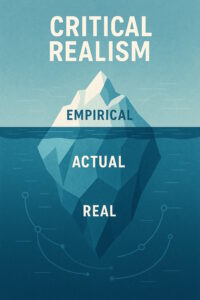
Critical Realism Explained: A Guide for Sociology Students
A beginner’s guide to critical realism in sociology. Learn about layered reality, structure and agency, emergence, and reflexivity, with real-world examples for first-year sociology students.

Beyond the Echo Chamber: Rescuing Critical Thinking in the Digital Age
Explore how digital media, educational trends, and ideological conformity are eroding critical thinking. This article examines the sociological roots of this decline and argues for the urgent revival of independent thought as a civic responsibility.

Explaining Ontology and Epistemology: Foundations of Sociological Thinking
A clear, student-friendly introduction to ontology and epistemology in sociology, exploring their meaning, significance, and practical application in research design.

Credentialism and the Crisis of Education: Why Experience Still Matters
Credentialism has transformed education into a race for qualifications. This article critiques its impact and champions experiential learning for real equity.

Society Wasn’t Built for Us: A Bourdieuian View of Neurodivergence
Exploring how Pierre Bourdieu’s theories of capital, habitus, fields, and symbolic violence reveal the hidden barriers faced by neurodivergent people.

Taste and Distinction: How Class Shapes What We Like
How does social class shape taste? This article explores Bourdieu’s concept of cultural capital, Goffman’s impression management, and contemporary critiques of taste hierarchies, gatekeeping, and cultural gentrification.